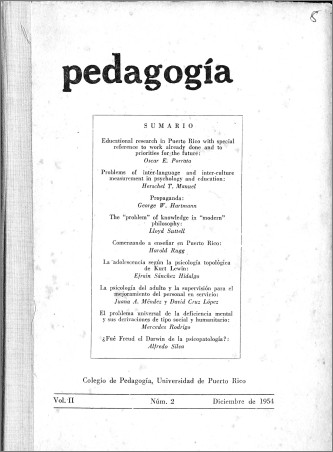Résumé
Cómo citar:
Suttell, L. (1954). The "problem" of knowledge in "modern" philosophy. Pedagogía, 2(2), 63-71. Recuperado de https://revistas.upr.edu/index.php/educacion/article/view/16584
Références
Frederick J. E. Woodbridge, An Essay on Nature (New York: Columbia University Press, 1940), p. 11.
Immanuel Kant, Critique of Pure Reason in Theodore Meyer Greene, ed., Kant: Selections (New York: Charles Scribner's Sons, 1929), p. 29.
Isaac Newton. Principles, Book III, "Fourth Rule of Reasoning in Philosophy."
John Dewey, A Common Faith (New Haven : Yale University Press, 1934), p. 26.
John Dewey, "Common Sense and Science: their Respective Frames of Reference," ]ournal of Philosophy, Vol. XLV, No. 8, April 8, 1948, p. 203.
John Dewey, Experience and Nature (Chicago : Open Court Publishing Company, 1925), p. 21.
John Dewey, Quest for Certainty (New York: Minton, Balch and Company, 1929), p. 200.
John Dewey, The Public and its Problems (London: George Allen and Unwin, Ltd., 1927), pp. 176-177.
John Herman Randall, Jr., The Making of the Modern Mind, revised edition (Cambridge, Massachusetts: Houghton Mifflin Company, 1940), p. 267.
John Locke, Essay concerning Human Understanding in Sterling P. Lamprecht, ed., Locke: Selections (New York: Charles Scribner's Sons, 1928 ), pp. 111, 112.
Rene Descartes, Rules for the Direction of the Mind in Ralph M. Eaton, ed., Descartes: Selections (New York: Charles Scribners Sons, 1927) , p. 44.
El contenido que aparece en la Revista de Educación de Puerto Rico se distribuye gratuitamente y está disponible bajo las prácticas de acceso abierto, de acuerdo con la licencia de Creative Commons, Atribución-NoComercial 4.0 Internacional (CC BY-NC 4.0). Mediante estos principios, la revista y sus autores permiten a los lectores acceder, reproducir y compartir los textos completos de los artículos. Los usuarios deben dar crédito a los autores de forma razonable sin sugerir que tienen el apoyo de ellos. Bajo ninguna circunstancia, los lectores pueden hacer uso de los contenidos con propósitos comerciales. Los autores conservan los derechos de autor sobre sus trabajos.

